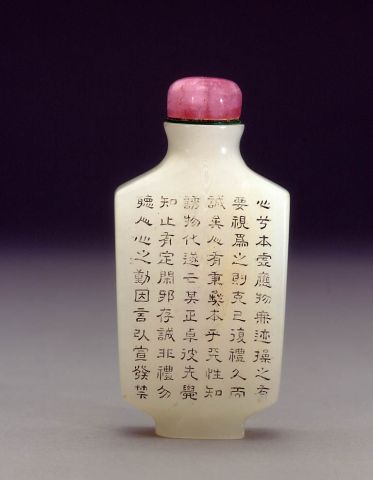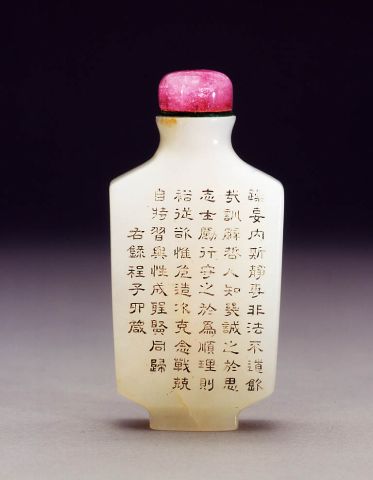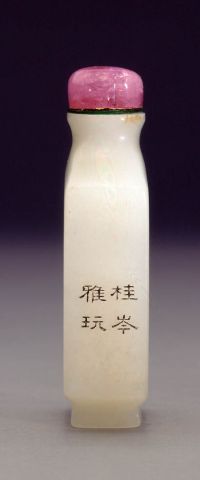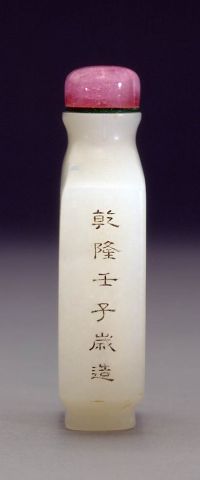



Bottle ID: 920
IMPERIAL, INCISED INSCRIPTIONS
Date: 1792
Height: 60 mm
Nephrite, of an even white tone, very well hollowed, of tapering flattened rectangular form, with shoulders sloping towards an everted mouth, and the base sloping to a neat rectangular foot rim, inscribed on both main faces with 'The Four Rules of Conduct', one narrow side inscribed 'Qianlong renzi sui zhao' ('Made in the Qianlong period, dated 1792'), the other narrow side inscribed 'Gui Chen ya wan' ('For Gui Chen’s elegant enjoyment').
Imperial, attributed to the Palace Workshops, Beijing.
Similar Examples:
Crane Collection nos. 162, 259, 500 and 921
Sotheby's, New York, October 25, 1997, lot 158, The Gerry P. Mack Collection.
Provenance:
Asian Art Studio
Christie's, New York, September 20, 2005, lot 488
The Estate of Martha M. Renk
Fu-Ming-Fair Gallery
Published:
Renk, Martha M., JICSBS, Summer 1987, "Calligraphy White Jade", pp. 16-17, figs. 1&2
Cheng Yi, (1033-1107), known as Zhengshu and also as Mr. Yinchuan was a philosopher of the Song Dynasty, and is the author of 'The Four Rules of Conduct'. He was known as one of the 'Six Great Masters' of the 11th century. Cheng enrolled in the national university in 1056 receiving his 'presented scholar' degree in 1059. As a Confucian scholar, he remained in the town where he was born, in Luoyang, as a teacher and philosopher. In 1086, he became "expositor-in-waiting" and gave many lectures to the emperor on Confucianism. Despite his high intellect he was both aggressive and obstinate, making a number of high-ranking enemies such as the well-known scholar Su Shi, the leader of the Sichuan group. In 1097 this lead to a general ban on his teachings, his property was confiscated and Cheng himself was banished for three years. His work was banned again in 1103, but he was finally pardoned in 1106, one year before his death.
'The Four Rules of Conduct' may be translated as:
In its original state, the mind is a void; it responds nimbly to external things.
To grasp it there is an essential principle, and that principle is vision.
Restrain yourself and treat others with propriety; in the long run you become attuned to Sincerity.
In man there is an innate constancy which is inherited from Nature.
Beguiled by intellect and changing together with external things, he then lost his equilibrium.
Noble are the enlightened ones, who know where to stop and retain their tranquility.
Ward off temptations, persist in Sincerity, do not lend your ears to talk of impurity.
When one’s mind stirs, he speaks to express the thoughts:
Hold back impulsive words and careless babble that the inner state may concentrate and rest unperturbed.
Never utter that which contradicts the laws of the sages; when you do speak out let it be in awe.
Men of wisdom detect motivation in its hidden instance, for they keep Sincerity in their thought.
Men will carry out their actions with perseverance; they hold fast to principle through their performance.
Go in accord with reason: you will prosper; Indulge in desires: you will be in danger.
Keep this constantly in minds even in hurried moments and discipline yourself feverishly.
Practice turns the habit into second nature, thus one may attain the state of both the sages and the virtuous.
< Back to full list

 English
English 中文
中文